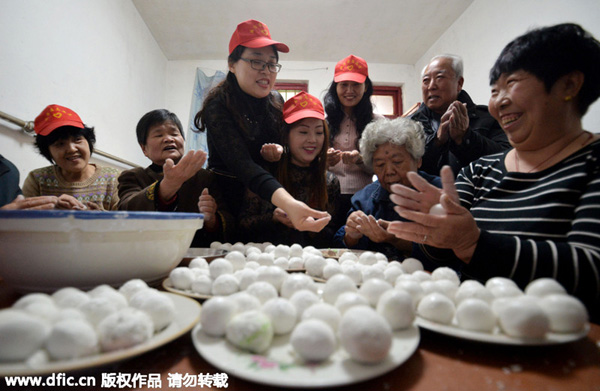 |
|
Volunteers and empty-nest seniors make Yuan Xiao, a typical food for Lantern Festival, in Handan, Hebei province, March 3, 2015. [Photo/IC] |
ZHENGZHOU - Many Chinese elderly are having a hard time as Lunar New Year celebrations end on Thursday and their grown-up children start another busy year of work, leaving them lonely.
In a pair of tragedies reported last week, two elderly women in Nanjing, capital of east China's Jiangsu Province, committed suicide out of solitude and despair shortly after their children went back to their own homes following a week of big family gatherings.
Both women were widows aged over 80. In a situation typical of the migrant labor economy in China, they lived alone most time of the year. The solitude became unbearable after a week of festivities and a short, teasing period of normal family life.
Experts have warned that elderly people, particularly the widowed, are vulnerable to separation anxiety and post-holiday blues when their grown-up children leave home.
Zhang Chun, a specialist on psychological crisis intervention in Nanjing, said young people should visit or at least call their elderly parents more often. "The elderly tend to feel depressed after the holiday, so we must not leave them in solitude and isolation."
Thursday, the 15th day of the Chinese Year of the Ram, is the Lantern Festival, traditionally taken as the end of Chinese Lunar New Year celebrations.
While the majority of the working population went back to their jobs on Feb 25, those who have ventured to take a longer holiday will have to start working again on Friday.
The end of the festivities is the beginning of agony for many lonely elderly, who in their younger days used to live in big families and take care of their parents and in-laws. In a fast-paced society, however, Chinese family patterns have changed drastically, from the once-common situation of four generations living under one roof to smaller families with just the young couple and a kid.
